I loved going to school because it was a time of new discoveries in science, language, and literature. I also enjoyed the imaginative games where we took on different roles. These playful interactions not only helped my friends and me adapt to our peers but also subtly prepared us for the complexities of adult life. While not everyone may feel comfortable engaging in such games, the ability to find joy in them is influenced by a multitude of factors: upbringing, living conditions, and parental involvement in a child’s interests. Reflecting on my own experiences and engaging with other parents, I realise just how safe and comfortable our childhood was—a stark contrast to what our children face today, growing up amid the pandemic and war.
Our children are born into an atmosphere of stress and uncertainty, often surrounded by sudden losses and alarms that inevitably affect us—their parents and caregivers. In my view, those born in the last two decades deserve even more freedom to be indulged in their innocent mischief, allowing them to truly experience the joy of childhood. Some parents, unwilling to take any risks, have chosen to relocate their children to safer countries. That decision, while personal, is a valid one. Conversely, for other parents, the choice to remain steadfast in their homeland is unwavering, presenting immense challenges and responsibilities yet also garnering respect and a deep desire for support.
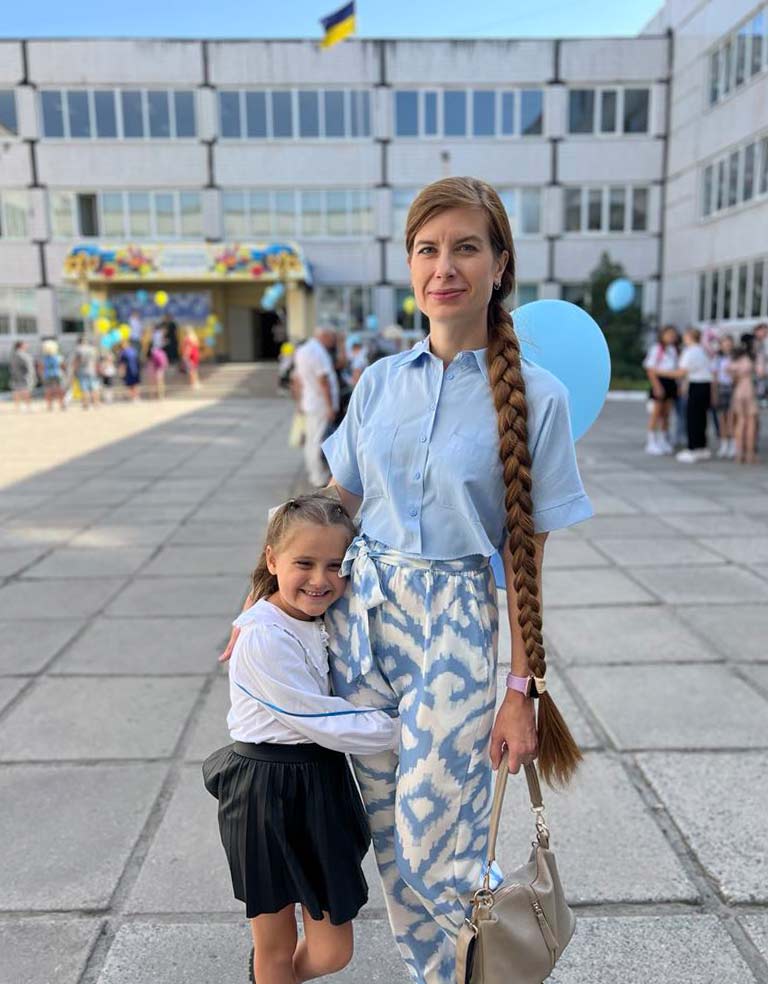
Sofiya Bohutska, journalist and mother of first-grader Hanna:
– The idea of relocating to a safer part of Ukraine first crossed our minds at the onset of the full-scale Russian invasion, but leaving the country was never a viable option for our family.
I recall the exodus from Kharkiv as families departed in droves. During that tumultuous period, we even welcomed two families into our home, one after the other. Yet, we chose to stay.
At the time, my daughter Hanna was just three and a half years old, and she had to stop attending the municipal kindergarten when it closed. As education transitioned online, we found ourselves contemplating how to keep her engaged. In February 2023, Hanna began taking individual English lessons at a private centre, where we also started preparing her for school. Since last September, she participated in a school readiness course that continued until June 2024. With a small group of just six students, she learned to count, write, and read in a gradual, pressure-free environment, which has been immensely gratifying. Concurrently, we maintained her online kindergarten experience. By March or April 2024, this program shifted back to in-person classes at the local lyceum, where Hanna later embarked on her first-grade journey. The senior group met every weekday from 8 a.m. to noon, fostering a sense of normalcy amidst the chaos.
The lyceum where my daughter studies are conveniently located in our neighbourhood, a place my husband once attended himself. Consequently, we decided to enroll Hanna there, despite it not falling within our registered area. After submitting the necessary documents, we awaited confirmation. We immediately opted for the Intellect of Ukraine Programme, confident in our daughter’s ability to manage the workload—something we felt capable of handling alongside her. With a year of preparation and the support of an in-person kindergarten group, Hanna was more than ready for school. Furthermore, since the school in our registered area did not offer this program, we believed we had a distinct advantage in securing her enrollment.
As for the admission process, it was remarkably straightforward, driven entirely by parental choice. The principal did mention that if there were any concerns regarding a child’s readiness, consultations with a psychologist were available, though we ultimately decided against that.
Our school features a shelter—essentially a converted basement—though I have yet to retrieve my child from there myself. My mother-in-law made the trek once and found it rather stifling, prompting me to plan a visit to assess the situation firsthand. While I can’t comment on the readiness of all schools in the city for the learning process, our lyceum appears well-prepared, with established protocols for air raid alerts. Currently, to facilitate the swift organisation of students’ descent to the shelter, two parents from the class take turns assisting the teacher during weekday lessons.
Having spent nearly two hours in the shelter with the children, I can attest to its discomfort. The ventilation system struggles to provide adequate airflow for the number of children present, a situation that urgently requires attention.
I know from friends that there are still issues with the kindergartens. For example, our friends in the Peremoha district can’t send their children to a public kindergarten because safety measures haven’t been organised. And the other kindergartens in the area where they could transfer their child are in the same situation. As a result, preschool education and children’s socialisation now lead to significant expenses. For instance, one individual English lesson costs us 400 hryvnias, and preparatory classes for school are 300 hryvnias. That’s twice a week for each class. If you want to send your child to a private kindergarten full-time, the price is at least 15,000 hryvnias, which is, of course, unaffordable for most parents.”
Live communication has become not just a necessity but a condition for the survival of humanity, including Ukrainians. Because tomorrow might never come… In addition to helping children adapt to life, acquiring new knowledge and experiences is also crucial. And, of course, learning in a face-to-face format has its advantages. When asked, “Do you prefer drawing through YouTube or when mom shows you with her hands?” my friend’s son thought for a moment and replied, “Mom and dad, and grandma should draw, and Uncle Tolik too, because he’s an artist.”
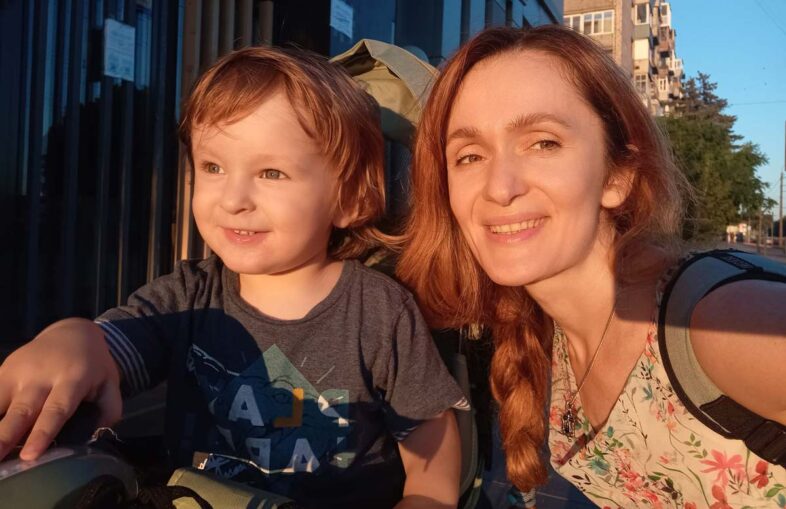
The 2024/2025 school year in the city of Dnipro, as in the rest of the country, started on September 2, 2024, in accordance with the decision of the Cabinet of Ministers of Ukraine. It will end on June 30, 2025, though the final schedule may change depending on the security situation in the region. All schools in Dnipro have organised their educational process considering martial law and the ongoing threats, so school administrations are ensuring proper conditions for children’s safety, including the use of shelters. While not all shelters are equally comfortable and cosy, they are a necessity.
Recently, I took my son to visit a private kindergarten situated in the heart of the city. The atmosphere was delightful, and the teachers appeared exceptionally dedicated. With small class sizes, the children seemed not only happy but also engaged and well-mannered. The program offered a diverse array of methods and approaches that fostered a rich learning environment.
Yet, one aspect gave me pause: the absence of a proper shelter. While the kindergarten operates actively, it lacks the necessary safety infrastructure. In the event of severe attacks, the children are gathered in a windowless room, where they huddle behind two walls for protection.
On the one hand, this arrangement feels insufficiently secure; on the other, during a direct strike, one must wonder: can any space truly guarantee safety?
Yulia, a resident of Dnipro, mother to four-year-old Mykhailo:
– Choosing a kindergarten is a daunting task even in the most peaceful of times. Factors such as nutrition, educational programmes, proximity to home, and the qualifications of teachers all weigh heavily on parents’ minds. However, in the shadow of war, a new and urgent criterion has emerged: safety. For the children who remain in Ukraine, education must now be coupled with protection.
My son, Mykhailo, is a lively and energetic child, so engrossed in his play that the outside world often fades away. Yet he is acutely aware that when the air raid siren blares, it signals a collective retreat to the shelter. At kindergarten, he and his classmates spring into action, lining up in pairs, hands clasped, as they make their way inside, shielded by two thick walls.
When the sounds of explosions echo nearby, the children descend into the underground shelter, which is fully equipped with water, snacks, a toilet, and even a play area. In this challenging environment, I find solace in knowing we made the right choice in selecting this kindergarten.
As the school year unfolds under wartime conditions, parents and children adapt in varied ways. For many families, safety has become the paramount concern. Schools are often compelled to shift to remote learning due to incessant air raid alerts or to conduct lessons in makeshift shelters. Unfortunately, for numerous mothers whose husbands are either fighting at the front or unaccounted for, in-person education remains the only viable option.
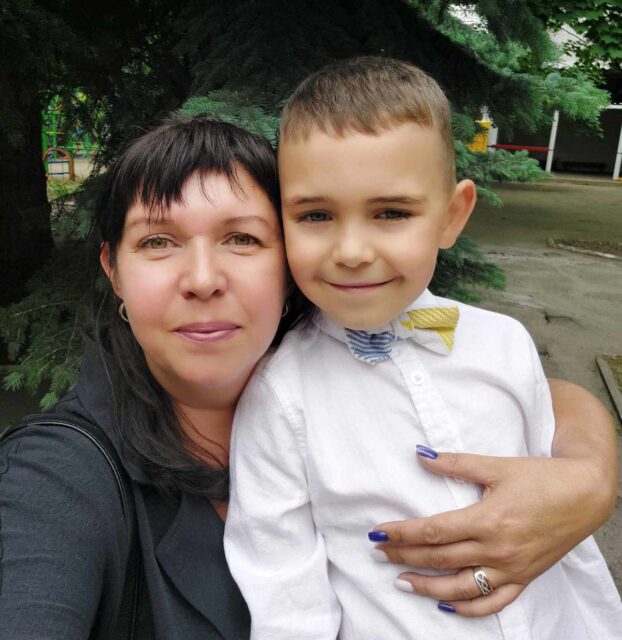
Olena Chupryna, mother of first-grader Bohdan and wife of a missing soldier, works in logistics:
– I’m raising my son, Bohdan, who has just embarked on his first-grade journey. This past year has been particularly challenging for us; my mother passed away, and my husband went missing in Bakhmut, leaving just the two of us. Given my demanding work schedule, selecting the right school became a critical priority. I had to carefully consider the location, the learning format, and whether the school offered elementary classes and adequate shelter.
In our area, there were only two options: one was entirely online, while the other offered offline classes but lacked elementary grades. To be candid, I believe the school reform has come at an inopportune time. Online learning was never a viable option for us. As a single parent juggling work responsibilities, I simply didn’t have the time to engage in full-fledged schooling with Bohdan. Thus, I set out to find the best possible solution.
We were fortunate to discover a school conveniently located near my workplace. It felt like a jackpot—offline, with elementary classes and only a ten-minute commute. Naturally, before submitting any paperwork, I reached out to other parents to gather insights about the school. The safety of my child was paramount, so I focused intently on this aspect. I inquired about the presence of a shelter, its condition, and whether it provided a secure environment. Armed with this information, I confidently chose this school for Bohdan.
The issue of safety en route to school has become increasingly pressing, particularly in light of frequent power outages and air raid alerts. In one instance, during a wave of intense shelling, parents found themselves unable to pick up their children on time due to blocked roads. Educators remained at the kindergarten well into the night, reassuring anxious parents over the phone that every child would be cared for and no one would be left behind.
Teachers are acutely aware of the psychological toll that military actions and uncertainty have taken on both students and staff. As stress levels rise, the importance of psychological support has become clear. Despite these challenges, the educational community is working diligently to adapt, introducing remote and hybrid learning formats to ensure the continuity of the educational process. For some children, however, the experience of sheltering can bring a sense of discomfort and unease. Consequently, many parents are now open to exploring both remote learning options and transferring their children to other institutions in search of a more stable environment.
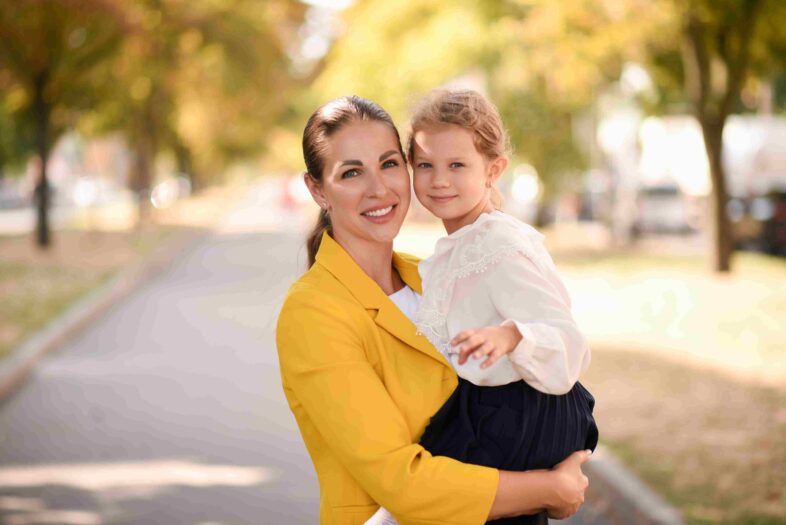
Yulia Dmytrova, a mother of three children, with her youngest, Yelyzaveta, starting first grade in 2024:
– I decided that my older sons should return to offline schooling. After three years spent in front of a computer and living outside the city, both their social skills and educational quality have suffered. The start of first grade for our youngest daughter, Yelyzaveta, also motivated this decision. She needs to experience the educational process firsthand—to understand what a classroom looks like, what a desk is, and who her teacher will be.
My sons resumed their education at School No. 23, where they have been since first grade, and they are currently in the 6th and 7th grades. We enrolled Yelyzaveta in School No. 148, which separates junior and senior levels and offers a school day that lasts until 5 PM—an arrangement that suits working parents like us. While I cannot say I am entirely satisfied with the safety measures at these schools, nor with the educational quality compromised by constant alerts, I value the social environment it provides.
In this setting, my children are learning to assert their boundaries. There is a healthy competition in their academic pursuits, and they are beginning to clarify their goals for the future. The boys continue their studies at a music school as well. While offline learning is undoubtedly the best option for our family, I recognise that not everyone is ready to make this transition.
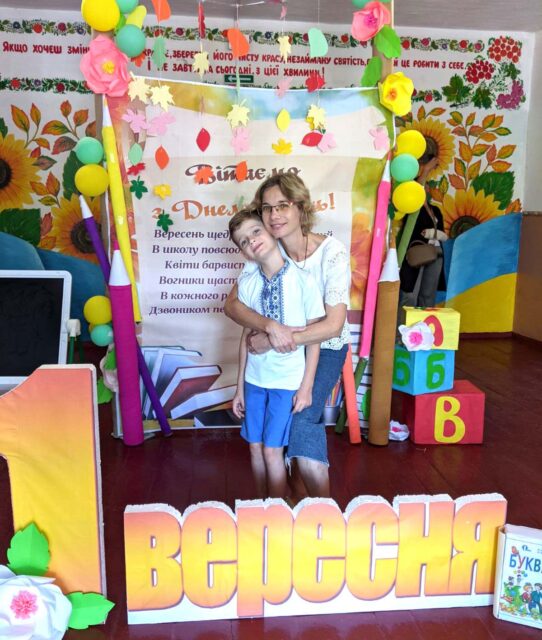
Natalia Rekunenko, a journalist and educator in the Creative Practices Department at the Dnipropetrovsk Specialised Artistic and Cultural College, is also the mother of Nazar, a sixth grader:
– We relocated from Dnipro to a village when my son was just a year and a half old. As he approached school age, my husband and I decided it would be best for him to complete his primary education here, especially because he had a wonderful primary school teacher. However, we intended for him to attend middle school in Dnipro, given that urban schools typically offer a higher quality of education than any rural institution. Now, as Nazar enters the 6th grade, he continues to attend the gymnasium in our village.
After the onset of the full-scale war, children studied remotely for four semesters. At the beginning of 2024, a mobile shelter was established near the school, allowing us to transition to a blended learning format.
While homeschooling is an option, Nazar was determined to attend school last year. However, he quickly struggled to adapt to the shelter environment, which was cramped, noisy, and filled with many children. This often leaves him feeling overwhelmed and occasionally in tears. As a result, I have begun exploring the possibility of transferring him to homeschooling or searching for an urban school where he can continue his studies remotely.
Thanks to various courses and publications on psychology, many parents have taken proactive steps to prepare themselves and their children for critical situations. This preparation includes breathing techniques, basic first aid supplies, and stickers or bags containing copies of important documents in case a child gets lost. Moreover, mothers, grandmothers, and even military fathers provide emotional support, helping the children remain calm. Some have even had the opportunity to live abroad before returning to their native Ukraine.
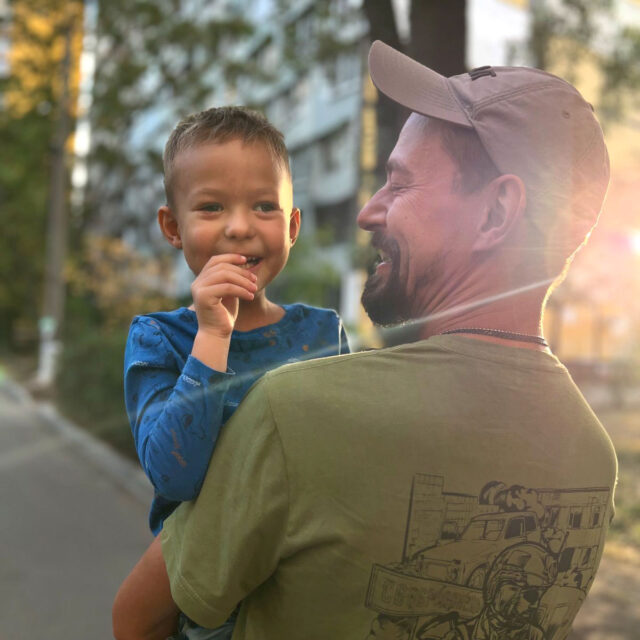
Mykola, a serviceman in Ukraine’s Armed Forces and the father of four-year-old Mykhailo:
– Our journey began in the autumn of 2023. Throughout the spring and part of the summer, my wife and our little one were abroad, and it was a challenge for her to manage alone with a small child, both physically and psychologically. After their return home in the summer of 2023, my parents lent us a helping hand with childcare. Shortly thereafter, I was transferred to another unit. Right after the transfer, I was sent to Kyiv for training, and my wife and child accompanied me. It was a precious opportunity to spend time together while sharing the responsibilities of caring for our child.
Even at that time, we were navigating the kindergarten landscape. In September 2023, there were promises that state kindergartens would reopen, albeit not for a full day—an expectation that ultimately went unfulfilled. Meanwhile, my wife began exploring private kindergarten options, and we found one conveniently located close to home. After returning from my training, I resumed my duties at my unit while my wife prepared for our child’s entry into kindergarten. We purchased new clothes and waited for the opening of the state kindergarten, but when it never materialised, we decided to enrol our child in a private institution instead.
In the first few days, we left him at the kindergarten for a few hours to observe how he adapted. Fortunately, he thrived; he enjoyed it, and within days he was attending half days, and by the second week, he was there for the full day. Given that the kindergarten was private and we had no holidays or breaks, we felt unprepared for the new academic year.
Today, schools are introducing new subjects, including the updated course “Defence of Ukraine,” alongside lessons on safety that cover mine and fire hazards. In kindergartens, older groups are also being taught about items that should not be touched and are encouraged to report anything unusual to their parents.
The video below provides educational information for children about mine safety:
In some schools, special officers are assigned to safeguard students and facilitate preventive discussions. The primary objective is to cultivate a secure educational environment, particularly through the equipping of shelters and bomb shelters. In instances where schools lack adequate facilities, children may be temporarily transferred to other educational institutions with safer conditions. Furthermore, school buses are being introduced to improve access to education in remote areas.
School principals underscore the significance of collaboration with parents and students to tackle the challenges posed by wartime and ensure quality education, even under these difficult circumstances.
According to local government authorities in Dnipro, the majority of schools in the region—618 institutions, or 76.6%—will operate offline and in a hybrid format. Students will learn in their classrooms but must move to shelters during air raid alerts. In schools where shelter space is insufficient for all, classes will be conducted in two shifts.
For preschoolers in kindergartens, various educational formats are available: in-person, online, and blended. Approximately 65,000 children will have the opportunity to attend kindergartens. Ninety-three institutions will operate offline, 286 will provide distance learning, and 492 will follow a blended approach.
Most higher education institutions have adopted a blended learning model, merging in-person classes with online sessions. Institutions of vocational pre-higher and professional (vocational-technical) education are also offering diverse learning formats: in-person, blended, and distance. Among vocational pre-higher education institutions, three will provide in-person education, 40 will follow a blended approach, and 18 will offer distance learning. For professional (vocational-technical) education institutions, six will operate in-person, 30 will adopt blended learning, and 13 will offer distance learning options.
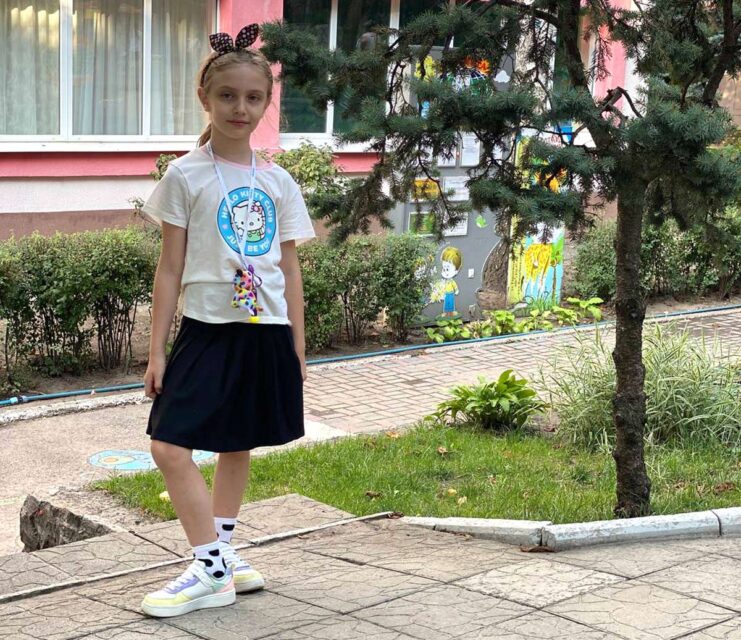
Bella, an eight-year-old daughter of Margaryta:
– I genuinely enjoy my school, my class, my teachers, and my classmates. While I like math, my favourite subjects are drawing, music, dancing, and physical education!
Every day, we hear the air raid siren, and our response is immediate: we pair up and swiftly make our way down to the shelter, following the route we’ve practised under our teacher’s guidance. Unfortunately, this means pausing our studies during the alert, but once the all-clear signal sounds, we eagerly return to our lessons.
It is crucial for all of us to recognise that education during wartime is a process that must be sustained, not halted. The absence of quality education and a sufficient cultural foundation has significantly contributed to the degradation of consciousness and destructive thinking within the “Russian nationality,” a decline in human qualities that has unfolded over centuries. Our children living here will be the first to assume the roles of educators, national leaders, ideological inspirations, and public, cultural, and political figures in Ukraine.
Ultimately, it is we, the adults, who bear the responsibility for our children’s knowledge, self-management, and aspirations. I am determined not to miss this critical moment, even amid missile attacks. For guidance, I find great support in the resource publications of professional psychologists like Svitlana Roiz and Larysa Didkovska, who, like us, navigate the challenges of wartime life, as well as in lectures from military chaplains. Additionally, insightful analytical pieces by seasoned military personnel—practical warriors rather than mere theorists—offer a more objective understanding of the front-line situation for ordinary people.
The school year for children also marks a new learning phase for parents, who must keep pace with their children’s development while striving to maintain mental balance within the family.

